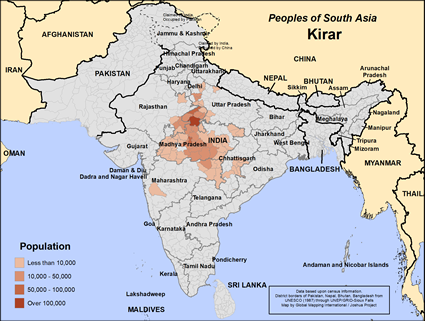Kirar in India

Photo Source:
Anonymous
|

Map Source:
People Group data: Omid. Map geography: UNESCO / GMI. Map Design: Joshua Project.
|
| People Name: | Kirar |
| Country: | India |
| 10/40 Window: | Yes |
| Population: | 908,000 |
| World Population: | 908,000 |
| Primary Language: | Hindi |
| Primary Religion: | Hinduism |
| Christian Adherents: | 0.00 % |
| Evangelicals: | 0.00 % |
| Scripture: | Complete Bible |
| Ministry Resources: | Yes |
| Jesus Film: | Yes |
| Audio Recordings: | Yes |
| People Cluster: | South Asia Hindu - other |
| Affinity Bloc: | South Asian Peoples |
| Progress Level: |
|
Introduction / History
The Kirar or Kirad are an agricultural people who live in central India. They claim to be descendants of Rajputs but other Rajputs do not accept them as belonging to their caste. Their name comes from a village in Rajasthan where they originally lived before migrating across India.
While the majority of the Kirar follow their traditional occupation of farming, some educated Kirar have gained positions in public service, schools, engineering and business.
Most Kirar live in the Indian state of Madhya Pradesh. Some also live in Rajasthan, Uttar Pradesh and Maharashtra. The primary language of the Kirar is Hindi. They also speak other regional Indian languages.
What Are Their Lives Like?
The Kirar live near riverbanks where they cultivate cotton, sugar cane, the grain sorghum, lentils and other crops. The lives of the Kirar are influenced by the monsoon wet/dry yearly cycles and the Hindu holidays. Their primary food is sorghum or white millet. Rice and wheat are only eaten on festival days. As a rule, they are vegetarians. Men are known to eat meat except for beef on feast days.
They are considered a Backward Caste and are eligible for reserved places in public jobs and education. In a recent survey 80% of Kirar men were literate and only 50% of Kirar women. Some Kirar work their own land while others work as landless laborers.
Brahmin priests are paid to perform important life rituals like birth, weddings and funerals. The Kirar are endogamous, that is they marry within their group. Families arrange marriages. A young person is not allowed to marry someone with the same surname or the surname of his or her mother's brother. Newly married couples live with or near the father of the groom. Sons inherit property with the eldest son receiving the parent's home. Dead marriage people are cremated while single people are buried.
What Are Their Beliefs?
They host a seven-day festival honoring Shiva, featuring dramatic performances of the Ramayana in the temple courtyard. Offerings of roasted corn, ghee, and barley oil are presented to Shiva, followed by a communal meal shared by the villagers. The Kirar also participate in local celebrations of Krishna Janmashtami, Krishna's birthday festival.
What Are Their Needs?
The Kirar need to hear the life-changing message of Jesus Christ in a way they can understand. They also need help in educating their children and in aiding them to obtain higher crop yields on their farms. The Kirar need to see that the rituals and good works of Hinduism will not make them right with a holy God.
Prayer Points
Pray the Lord sends Christian workers to befriend the Kirar and share with them the gospel of Christ.
Pray God softens the hearts of the Kirar so they might be open to hearing the claims of Christ.
Pray for God to win many Kirar to himself and that Bible-believing, growing churches are planted in their community.
Pray for them to have the spiritual hunger it takes to seek and find the Lord no matter what the cost.